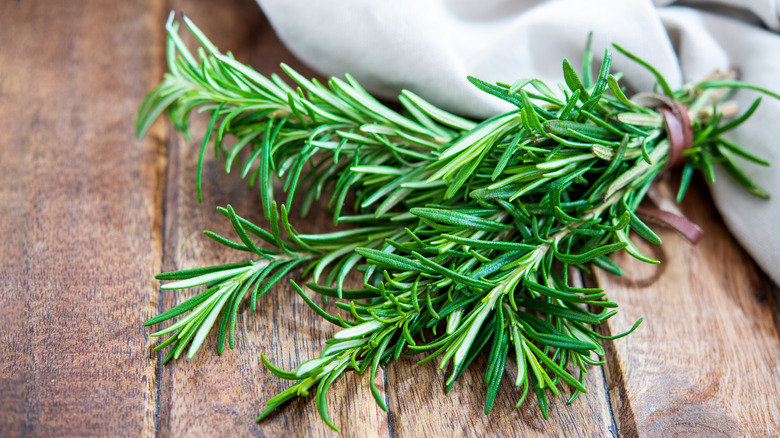The Absolute Best Substitutes For Rosemary
Woody and aromatic, rosemary adds a distinctive taste to meals. The herb smells of fresh pine and has a host of benefits, from improving the immune system to lowering stress and anxiety. You can also add rosemary to gin cocktails for a boost of herbaceous flavor, or use the sprig as a decorative touch on roast chicken.
The herb is certainly popular, but when you can't find any in your spice cabinet, you may be left scrambling around, wondering what to use instead. If your herb collection extends slightly past rosemary, finding an alternative shouldn't be difficult. Another common herb, fresh thyme, is a great substitute for rosemary.
The aromatic shares a similar mild, earthy scent; however, it can lean a bit minty or floral at times. Unlike rosemary, thyme has a softer texture and the leaves are small, but it is no less a welcome addition in meals. Sage is a great rosemary alternative; the herb tastes very similar, but with a more intense flavor that has minty, citrus nuances.
Choose your rosemary alternative based on your meal
Rosemary has tons of versatility; it can be used in lamb, steak, or chicken meals, as well as in breads and soups. One of the best tips you need when cooking with herbs is this: Know what aromatic best complements your meal. Sure, you can add a dash of thyme when cooking a steak — but the strong aroma and flavor of sage is a better choice. The distinct taste holds its own in a steak dish, meshing with other flavors instead of shrinking into the background.
For a lamb roast, thyme or other rosemary alternatives like bay leaves and peppermint taste best with the dish. Lamb and mint have a similar chemical compound, making the pairing almost inseparable. Bay leaves have a slight menthol flavor, which also works well with lamb. To season chicken, use an equal combination of thyme and sage. The flavors balance each other out perfectly, with the thyme tempering sage's strong taste.

